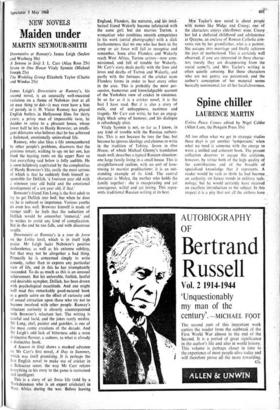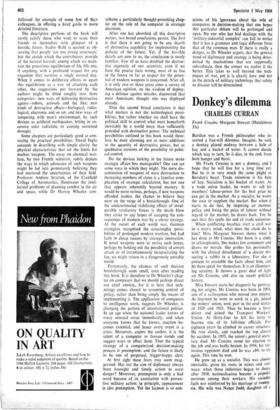Spine chiller
LAURENCE MARTIN
Unless Peace Comes edited by Nigel Calder (Allen Lane, the Penguin Press 35s) All too often what we get in strategic studies these days is yet another 'symposium,' when what we need is someone with the energy to Write a unified and coherent book. The present collection deserves to escape this criticism, however, by virtue both of the high quality of the contributions and of the breadth of specialised knowledge that it represents. A reader would be rash to think he had become,. an authority on future trends in military tech- nology, but he would certainly have received an excellent introduction to the subject. In this respect it is a pity that not all the authors have.,
followed the example of some few of their colleagues, in offering a brief guide to more detailed literature.
The descriptive portions of the book will surely satisfy those who want to scare their friends or themselves with glimpses of a horrific future. Isador Rabi is quoted as ob- serving that people 'are not strong structures,' but the sketch which the contributors provide of the natural hazards among which we main- tain the precarious equilibrium of life fills one, if anything, with a profound respect for any organism that survives a single normal day. When it comes to deliberate efforts to upset this equilibrium as a way of attacking each other, the suggestions put forward by the authors might be fitted roughly into three categories: new ways of delivering destructive agents—robots, aerosols and the like; new kinds of destructive effects—biological, radio- logical, electronic and so on; and new ways of tampering with man's environment, by such devices as artificial earthquakes, letting in ex- cessive solar radiation, or causing sustained drought.
Some chapters are particularly good at con- veying the practical possibilities. David Inglis succeeds in describing with simple clarity the physical characteristics that set the limits for nuclear, weapons. The essay on chemical war- fare, by two French scientists, subtly depicts the Ways in which advocates of such weapons might be led into prematurely believing they had mastered the uncertainties of their field. Professor Andrew Stratton, of the Cranfield College of Aeronautics, illuminates the intel- lectual problems of planning combat in the air and space, while Dr Harvey Wheeler con- tributes a particularly thought-provoking chap- ter on the role of the computer in strategic decisions.
After one has absorbed all this descriptive matter, two broad conclusions persist. The first is that there is not going to be any dearth of destructive capability for implementing the policies of the future. Yet, if the horrible details are new to us, the conclusion is surely familiar. Few of us have doubted the destruc- tive ingenuity of our scientists; even if we have the precise facts wrong, most of us live in the future so far as respect for the poten- tial of modern weapons is concerned. After all, it is only two or three years since a survey of American opinion, on the wisdom of deploy- ing a defence against missiles, discovered that most Americans thought one was deployed already.
Thus the second broad conclusion is that what matters is not the technological possi- bilities, but rather whether we shall have the political skill to control what must henceforth inevitably be a world more than sufficiently provided with destructive power. The technical possibilities mitlined in this book would .there- fore be most alarming not as mere additions to the quantity of destructive power, but as qualitative erosions of the possibility of politi- cal control.
Do the devices lurking in the future make strategic affairs less manageable? One can see some ways in which they might. The mere dis- semination of weapons of mass destruction to increasing numbers of states is a familiar com- plication of strategic calculation, but not one that appears inherently beyond mastery. It would be more serious, perhaps, if new weapons afforded leaders the chance to believe they were on the verge of a breakthrough. One of the underestimated stabilising effects of invul- nerable retaliatory forces is the death blow they strike to any hopes of escaping the con- sequences of modern war by a clever strategy. At the outset of each world war, German strategists recognised the catastrophic possi- bilities of prolonged modern warfare, but had faith in cheap success by strategic innovation. If novel weapons were to revive such hopes, perhaps by holding out the possibility of covert attack or of instantaneously incapacitating the foe, we might return to a dangerously unstable world.
Fortunately, the chances of such decisive breakthrough seem small, even after reading this book. It is therefore to Dr Wheeler's chap- ter on computers that we should perhaps direct our chief anxiety, for it is here that tech- nology comes closest to assuming control of policy, rather than being simply the means of implementing it. The application of computers to intelligence work, suggests Dr Wheeler, is changing the pattern of international politics.
In an age when the national leader knows of every unusual event immediately, and when everyone knows that he knows, reaction be- comes essential, and hence every event is a crisis. Moreover, argues the author, it is the talent of a computer to foresee trends and suggest ways to affect them. Thus the typical strategy of a computerised decision-making process is preemption; and the future is likely to be one of perpetual, trigger-happy alert. At first sight these fears may seem exag- gerated. Has not the aim of diplomacy always been foresight and timely action to avert danger? Moreover, preemption is only a bad word because of its association with preven-
tive military action; in principle, appeasement is. also preemption. Yet the layman is so con- scions of his- ignorance about the role of Computers in decision-making that one hopes this particular debate will be prolonged and open. No one who has had dealings with the 'military-industrial complex' can fail to notice that it has a grammar and logic different from that of the common man. If there is really a danger, as Dr Wheeler argues, that the general trend of diplomacy and strategy is being deter- mined by mechanisms that are supposedly subordinate, then the sooner we realise it the better. This takes us well beyond the tech- niques of war, yet it is clearly here and not in the details of military technology that safety or disaster will be determined.







































 Previous page
Previous page